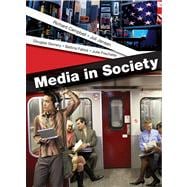Explore the stories media tell along with the ones we tell about the media when we describe how it affects us as Media in Society teaches you how to view the media through a critical eye.

Note: Supplemental materials are not guaranteed with Rental or Used book purchases.
Purchase Benefits
What is included with this book?
Explore the stories media tell along with the ones we tell about the media when we describe how it affects us as Media in Society teaches you how to view the media through a critical eye.
Joli Jensen is the Hazel Rogers Professor of Communication at the University of Tulsa, where she teaches courses on media, culture and society. She is the author of Is Art Good for Us? Beliefs about High Culture in American Life (Rowman & Littlefield, 2002); Redeeming Modernity: Contradictions in Media Criticism; (Sage, 1990) and The Nashville Sound: Authenticity, Commercialization and Country Music (Vanderbilt, 1998) as well as book chapters and research essays on media criticism, communication technologies, communication theories, the social history of the typewriter, and fans and fandom. Dr. Jensen received her PhD in 1985 from Institute of Communications Research at the University of Illinois. She has also taught at the University of Virginia, and the University of Texas-Austin. You can find out more about her at http://www.personal.utulsa.edu/~joli-jensen/
Douglas Gomery is the author of 21 books, and more than 600 articles on the history and economics of the mass media. His book Who Owns the Media? earned the Robert Picard Award as the best economics book by the Association for Education in Journalism and Mass Communication in 2001. His book Shared Pleasures earned the prize for TV-film book presented by the Lincoln Center Library in 1991. Dr. Gomery continues to research books and articles on the history and economics of the mass media as Resident Scholar at the Library of American Broadcasting at the University of Maryland's Philip Merrill College of Journalism.
Bettina Fabos, an award-winning video maker and former print reporter, is an associate professor of visual communication and interactive media studies at the University of Northern Iowa. She is the author of Wrong Turn on the Information Superhighway: Education and the Commercialized Internet (2004). Her areas of expertise include critical media literacy, Internet commercialization, the role of the Internet in education, and media representations of popular culture. Her work has been published in Library Trends, Review of Educational Research, and Harvard Educational Review. Fabos has also taught at Miami University and has a Ph.D. from the University of Iowa.
Julie Frechette is Professor of Communication at Worcester State University, Worcester, MA, where she founded and co-directed the Center for Teaching and Learning. Her book, Developing Media Literacy in Cyberspace: Pedagogy and Critical Learning for the Twenty-First-Century Classroom (Praeger Press, 2002), was among the first to explore the multiple literacies approach for the digital age. She is the author of numerous articles on media literacy and feminism, and has written chapter inclusions for the books Literacy Practices in Late Modernity: Mastering Technological and Cultural Conversion (Hampton Press, 2012), Digital Generations: Children, Young People, and New Media (Lawrence Erlbaum, 2006), and Media Literacy: Transforming Curriculum and Teaching (Blackwell Publishing, 2005). She served as an inaugural member of the Editorial Board for The Journal of Media Literacy Education, and was selected by the National Telemedia Council for the special journal series, "Emerging Scholars in Media Literacy."
The New copy of this book will include any supplemental materials advertised. Please check the title of the book to determine if it should include any access cards, study guides, lab manuals, CDs, etc.
The Used, Rental and eBook copies of this book are not guaranteed to include any supplemental materials. Typically, only the book itself is included. This is true even if the title states it includes any access cards, study guides, lab manuals, CDs, etc.